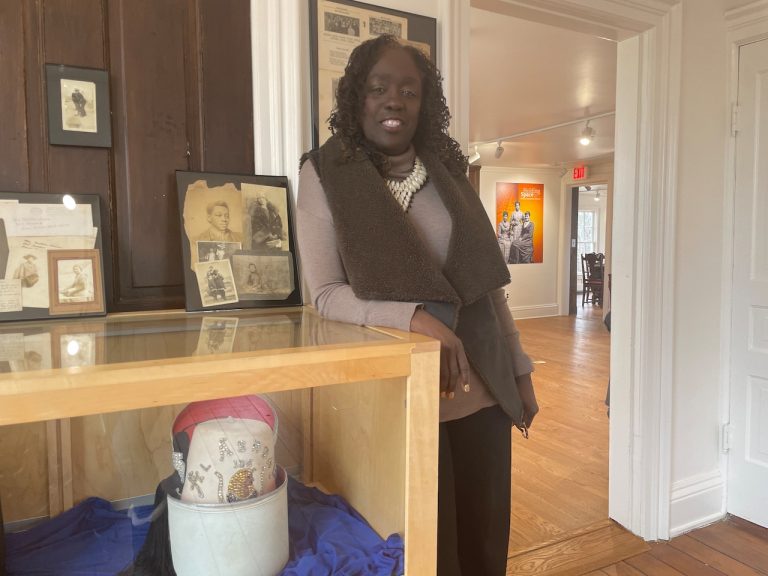ANN ARBOR, MI — A writing desk once used by Herbert Day for schoolwork is among local artifacts on display in an Ann Arbor museum’s new permanent home. Day was a member of one of Washtenaw County’s earliest Black families.
The African American Cultural and Historical Museum of Washtenaw County is open in its new home after renovating and relocating to a farmhouse dating back about 180 years. The museum, at 3261 Lohr Road, is located near big box retailers and condo communities in Pittsfield Township just outside Ann Arbor.
RELATED: Renovation of historic Ann Arbor-area farmhouse could create home for Black history museum
“We will always center on local history,” Debby Mitchell Covington, the museum board’s chair, said.
“Our mission is focused on local history, although we broaden it beyond,” she said. “We’ll always have a local component to the work that we do.”
A Buffalo Soldier uniform is among local Black history artifacts on display at The African American Cultural and Historical Museum of Washtenaw County’s new permanent home on Lohr Road near Ann Arbor, Wednesday, Feb. 5, 2025.Jen Eberbach/MLive
They are also trying “to bridge the gap” between Ann Arbor and Ypsilanti through museum programs and collaborations with other local institutions, she said.
The museum is open noon to 4 p.m. Saturdays and Sundays. It also hosts special events, classes and workshops. During Kwanzaa, the museum hosted seven days of events. It is currently offering a workshop on genealogy.
The museum’s current exhibit, “Black History: Local Roots,” showcases artifacts and stories from prominent Black families and individuals, including a case full of objects once belonging to pioneering Ypsilanti attorney Vanzetti Hamilton, the namesake of a bar association in the county.
A typewriter and other possessions once belonging to Robert Hayden, the first Black U.S. Library of Congress Poet Laureate, are also on display. Hayden, the University of Michigan English department’s first Black faculty member, was born in Detroit and lived in Ann Arbor. The Ann Arbor City Council granted his house historic status in 2023.

A typewriter and other possessions once belonging to Robert Hayden, the first Black U.S. Library of Congress Poet Laureate, are on display at The African American Cultural and Historical Museum of Washtenaw County, Feb. 5, 2025.Jen Eberbach/MLive
The exhibit highlights the accomplishments of choral director Eva Jessye of Ann Arbor, whose group was named by Dr. Martin Luther King Jr. as the official choir of the 1963 March on Washington. There’s a church pew from the Brown Chapel African Methodist Episcopal Church in Ypsilanti. Visitors can also learn about early Black business owners, Ypsilanti women’s club the Palm Leaf Club, and other moments in the local Black community.
Preserving Black history is particularly important in today’s national political climate, Mitchell Covington said.
“There’s been an effort to erase our history, and we have to preserve our history,” she said. “If we don’t do it, who will. Our efforts to preserve history and our role in promoting education about Black history is crucial right now.”
The farmhouse, known as the Byrd Center, for a time served as the office of David Byrd, a prominent Black architect, one time county commissioner, and Washtenaw Community College instructor. Byrd and his wife Letitia Byrd purchased it in 1975. He rehabilitated it with his students. He also built a chapel behind the house, now the Episcopal Church of the Incarnation. It was finished just months before his death in 1987.

Letitia Byrd is photographed in 2001 inside the 1840s-era farmhouse at 3261 Lohr Road in Pittsfield Township that her husband David Byrd restored in the 1970s and 80s.Lon Horwedel | The Ann Arbor News archives courtesy of OldNews.AADL.org
Letitia Byrd, an educator and community activist, served as one of museum’s founding members. Prior to her death in 2018, she had resisted selling the property to developers, her son Kip Lightfoot previously said.
Lightfoot sold the property to the museum in December 2022 and petitioned to get the property registered in 2023 as an historic district. The museum had used the house for artifact storage and meeting space for more than 15 years.
The museum was founded in 1993 as “a museum without walls.” It organized and co-sponsored exhibits and events at other venues in the county, including helping to establish tours of the Underground Railroad in the county. In 2021, the museum signed a lease at a temporary space on Pontiac Trail.
The museum was able to purchase the farmhouse and renovate it “unencumbered,” without taking on any loans or debts, Mitchell Covington said.
“The board over the years have been frugal, so we were able to purchase the building in cash,” she said, also noting the museum raised enough money to renovate the farmhouse “because of the trust the community has in us.”
Among other donations and grants, the effort to renovate the farmhouse received $150,000 from the Song Foundation plus an additional $150,000 personal contribution from Linh and Dug Song.

A weeklong Kwanzaa celebration at The African American Cultural and Historical Museum of Washtenaw County in Ann Arbor featured story time with Black Men Read on Dec. 31, 2024.Provided by The African American Cultural and Historical Museum of Washtenaw County
“We are honored to uplift (the museum’s) work in hosting conversations and celebrations around African American accomplishments and the Byrd family’s legacy. It is a privilege to experience their community-driven approach to cultural advocacy and education,” foundation Co-Founder Linh Song said in a statement.
Looking towards the future, plans include renovating a barn on the property for more programming.
The museum also plans to use the lawn for community gatherings during the warm months and offer summer day camps and Black history education for young people.
They also want to increase offerings related to the Underground Railroad tour.
Want more Ann Arbor-area news? Bookmark the local Ann Arbor news page or sign up for the free “3@3 Ann Arbor” daily newsletter.




